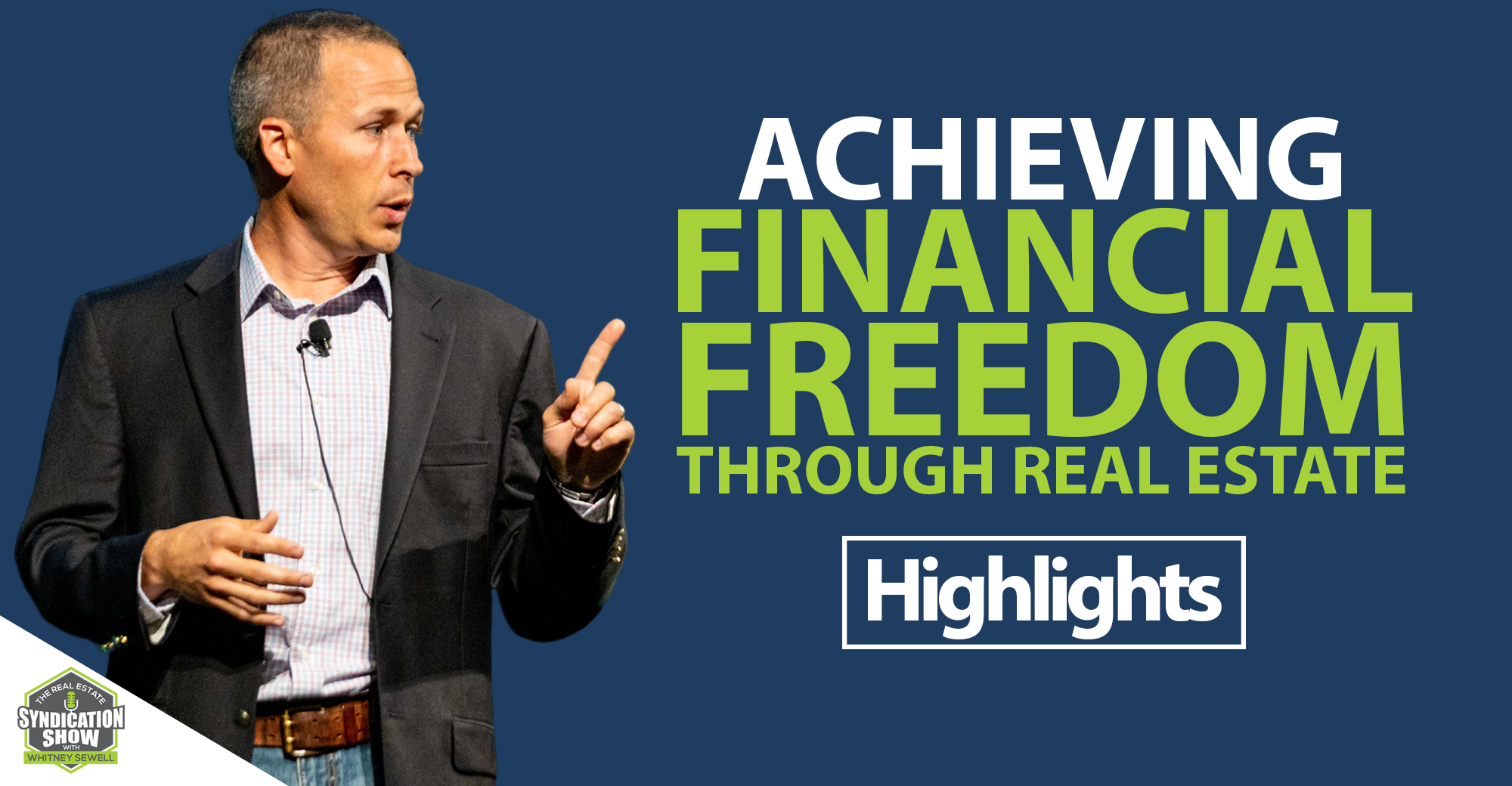If you are looking to create residual income, achieve financial freedom, or give your apartment building portfolio a boost, this episode is going to give you a lot of value! In this #Highlights episode, we look back at our conversations with Rodney Miller of Miller Investment Group and Tim Bratz of CLE Turnkey Real Estate.
Watch the episode here:
Listen to the podcast here:
Rodney shares how he’s become successful in managing single-family homes and creating passive income from multifamily units. Meanwhile, Tim shares how he shifted from renovating residential houses to renovating apartments after realizing that’s where the majority of his net worth came from. Click the play button now and be inspired to kick start your real estate journey today!
Key Points From This Episode:
- Rodney talks about the process of how he learned the multifamily syndication business.
- The importance of finding a mentor and networking to grow your business.
- Rodney discusses a deal that fell through and how he was able to overcome it.
- The real estate business is a relationship business and a close-knit group.
- Why do you need to treat everybody with respect?
- Tim shares his background and his focus on the real estate industry.
Tweet This!
“Go find somebody that’s doing what you want to learn how to do or find a group of people that are doing it. Join the group, work for somebody that’s doing it or pay somebody to show you how to do it. It’s the quickest way to get from A to Z.” – Rodney Miller
“This business, it’s definitely a relationship business and it’s a close-knit group of people.” – Rodney Miller
“You should treat everybody you deal with with respect. Do what you say you’re going to do because they can come back to bite you.” – Rodney Miller
“The reality is my net worth, what was making me wealthy was all from my apartment building portfolio. That’s where the majority of the net worth came from. That’s where I wanted to focus on.” – Tim Bratz
“Obviously passive income, doing something, being hands-off and having their business that was passive or an asset that passively created income on a regular basis. I love that but a lot of us get into real estate for that allure. We get jammed up and stuck in that rat race of transactional deals.” – Tim Bratz
Links Mentioned in Today’s Episode:
Miller Investment Group website
WS199: Financial Freedom Through Real Estate Investing with Rodney Miller
CLE Turnkey Real Estate website
WS200: Financial Freedom Through Commercial Real Estate with Tim Bratz
About Rodney Miller
Rodney Miller is an active real estate investor with over 200 transactions since 2003. He is the CEO of a chain of medical clinics in Oklahoma City. He also owns and manages over 100 single-family homes, is a key principle and sponsor in 284 multifamily units, and is a passive investor in 305 Multifamily units.
About Tim Bratz
Tim Bratz is the CEO and founder of CLE Turnkey Real Estate, a real estate investment company that acquires and transforms distressed commercial and apartment buildings into high-performance investment assets.
Tim began his real estate career in 2007 as a commercial broker in the competitive NYC real estate market, where he saw the true potential of investment real estate to transform personal finances and provide financial freedom.
He spent time reading, attending workshops, and networking with accomplished entrepreneurs, and found that being resourceful was a cornerstone to becoming successful. Tim’s resourcefulness helped him build his first real estate company in 2009 in Charleston, SC, when he used a credit card to acquire his first property.
Tim transformed a rundown duplex all on his own and turned a profit on his first deal. He reinvested those proceeds, meanwhile seeking private capital to expand his growing company. Today Tim still uses this formula for success, which all starts with being resourceful and having the right mindset. Working in real estate, Tim has learned how to build a passive business and create a residual income that allows him to live the lifestyle of his choice.
Tim now focuses on educating and empowering active and passive investors to become financially free through commercial real estate. Tim’s investment companies own over 2,000 rental units across five states. Tim is a husband and proud father, mentor for The Advisor’s Council Mastermind, graduate of the Goldman Sachs 10,000 Small Businesses program, and active member of several high-performance national entrepreneur masterminds, including Collective Genius, Deal Maker Family, The Brotherhood, and Multifamily Boardroom.
Full Transcript
EPISODE 1294
[INTRODUCTION]
0:00:00.0
Whitney Sewell (WS): This is your Daily Real Estate Syndication Show and I’m your host, Whitney Sewell. Today is a Highlights show that’s packed with value from different guests around a specific topic.
Don’t forget to like and subscribe but also go to LifeBridgeCapital.com where you can sign up to start investing in real estate today. I hope you enjoy the show!
[INTERVIEW 1]
WS: Our guest is Rodney Miller. Thanks for being on the show, Rodney.
Rodney Miller (RM): Thanks for having me.
WS: You started learning about multifamily. Tell us about that process. Why you would go from this business that you already have established, to all these single-family homes? Why would you then venture into the multifamily or even syndication?
RM: I always wanted to do multifamily, but it always seemed too sophisticated for me. I don’t know why. I never took a hard look at it. Because you look at a 100-unit complex or 50-unit and think, “That’s millions of dollars. I don’t deal with that. I deal with $50,000 houses or $75,000. That’s way out of my league. That’s for the rich guys.” A couple of years ago I decided I was going to take a hard look at it and I read a couple of books. I was like, “No, it’s very doable.” It’s probably easier to do than the single-family business. It’s a mindset thing. You don’t know what you don’t know until you look into it. I’d say it’s 99% mindset that it looks like this big ugly monster that you don’t want to take on, it’s scary. Once you look at it, you break it down into little pieces, it’s not a big deal.
After reading a few books, I was like, “I can do this.” The next step was, “Who can help me do this?” I started looking for mentors and coaches and groups that I could start associating with. I found the Brad Sumrok group out of Dallas and I hooked up with that group. I go there every month and network and associate with folks that are in the multifamily business. It has built a good network over the last couple of years doing that. There are folks who think like I do or want to get into the business or are already in the business. It’s been a great ride. I’ve learned a lot. I’m not an expert by any means, but I’m learning quickly and starting to dip my toe in the water. I had a deal in 2018 that fell through and I’ve got a deal now, so things are starting to move in the right direction.
WS: There are some key things there. You talked about you found a mentor and also a network. I see time and time again people who are successful in this business or in about any business. You’re going to have a mentor or a coach, somebody that’s helping you, giving you some guidance, or keeping you motivated. Also, the network of friends or other investors that have been there and done that possibly or where you’re at least in the process.
WS: As Tony Robbins says, “Success leaves clues.” Go find somebody that’s doing what you want to learn how to do or find a group of people that are doing it. Join the group, work for somebody that’s doing it or pay somebody to show you how to do it. It’s the quickest way to get from A to Z. I’ve gotten pretty good at it. If I want to take my business to the next level or I want to do something different, I find somebody who’s done it and I find a way to partner up with them. It gets you there a lot quicker.
WS: Hitch your horse to their wagon. You mentioned a deal that fell through. Is that something we can talk about and discuss what happened with that opportunity or that deal?
RM: Yes, I met some guys at one of these networking events. They had gotten an 80-unit deal in East Dallas that is a $4 million deal. We had to raise $1.5 million for it. They asked me if I’d like to be a cosponsor on it and I said, “Yes. That would be my first deal.” They brought me in to help raise capital and I think they needed some help on the net worth part of it as a KP. Everything went smooth and then the thing caught on fire a couple of weeks before we were supposed to close on it. That was a great lesson on how not to be a seller because these sellers became very difficult to work with. They saw that they could fix the issues, put it back up for sale, and make a little bit more money. I don’t know if they did when it was all said and done, but they put the screws to us. They made it difficult to close. We had to eventually abandon the deal, refund all of our investors, give their money back, and pay them some interest for the time we held their money. Then we’re out $30,000, $40,000 and due diligence costs and all that, which the sellers didn’t care. They already get their money. It taught me a little lesson on how to do the right thing. Don’t always go after the extra dollar, do the right thing. It’s a good experience. I learned a lot.
WS: It’s a very small community I find in this syndication business. There are so many people that know everybody. When I hear stories like that, which isn’t very often, thankfully, I felt that person’s not going to be in the business for a very long time. They’re not looking at definitely a long-term approach. Maybe they have been, some people manage to stay in the business for a long time and keep people off somehow. Tell us some things that you learn there about how to be a good seller or some things that happened that you would do differently on the next one.
RM: I don’t think they came out any better. After our contract bust, they sold it to somebody else. I would say if you make a deal with somebody, follow through with the deal. Do what you say you’re going to do. It’s a small group of people. I can guarantee you that I wouldn’t talk highly of the folks after that deal fell through. Their name will come up, someday they’ll want to buy themselves from somebody I’ve talked to and that person’s got in the back of their mind, “Is this person going to follow through and do what they said they were going to do?” This business, it’s definitely a relationship business and it’s a close-knit group of people. Do the right thing with brokers. Buyers and sellers should do the right thing. You should treat everybody you deal with with respect. Do what you say you’re going to do because they can come back to bite you.
[INTERVIEW 2]
WS: Our guest is Tim Bratz. Thanks for being on the show, Tim.
Tim Bratz (TB): Whitney, I’m excited to be here. Thank you for having me.
WS: Give the audience a little more about who you are and what your focus is in real estate.
TB: I appreciate you for having me. I appreciate all the value that you bring to the table. I’m 33 years old. I went through college when the market was going gangbusters last time. In ’03 to ’07, I got involved with real estate and people said, “If you want to make money, get involved in real estate.” That’s what motivated a 21-year-old kid back then. My brother lived out in New York City. I went out there. I became a commercial real estate agent representing landlords and businesses, finding spots. I brokered my first lease out there that was 400 square feet. We signed a $10,000 a month lease agreement on 400 square feet with 4% annual escalation and a twelve-year term.
I realized pretty quickly I was on the wrong side of the coin. I needed to be owning rental property instead of brokering it. You start reading all those books on personal development and real estate, all these different things. I realized that I love the concept of residual income and doing something one time and getting paid on it over and over again. Obviously passive income, doing something, being hands off and having their business that was passive or an asset that passively created income on a regular basis. I love that but a lot of us get into real estate for that allure. We get jammed up and stuck in that rat race of transactional deals.
We go start flipping houses or wholesaling houses. I was doing a lot of that. I’ve gotten involved in the turnkey business where I buy a single-family house, fixed it up, package it with tenant management and sell it off to somebody who wanted to own real estate passively. A couple of years ago, I looked at my portfolio, where was I making my money and where was I spending my time? 90% of my wealth came from my apartment buildings that I was pretty much passively invested in. It was about 10% of my time. I pivoted my entire residential investment team into apartments. We went from about 400 units a couple of years ago to a little over 2,100 units now.
WS: I hear so often about people that get into real estate and they develop a flipping business or something about wholesaling. They’re creating another job. Eventually it seems as they get into multifamily, they’re like, “Why didn’t I start this a long time ago?” You realized that your wealth was coming from your passive investments in multifamily, is that right?
TB: Yeah. Majority of my wealth was being created in my holdings versus this transactional. If I went and sold something, I keep the lights on, put some food on the table. I have to go do it again in order to get paid again. We’re in real estate, so some of that is the actual cash that was coming in from these and some of it was in equity in the project itself. The reality is my net worth, what was making me wealthy was all from my apartment building portfolio. That’s where the majority of the net worth came from. That’s where I wanted to focus on. The transactional stuff is cool. You can have a good lifestyle. You can get rich doing that but you can’t build wealth doing that.
WS: That was the thing that was taking the least amount of your time.
TB: I raised some equity, raised some capital for some joint venture partners and helped sponsor some of those loans and got involved in some of my own projects as well. I’m out of Cleveland, Ohio but I invested in South Carolina, Georgia, Florida, Texas, Oklahoma, a couple of other areas. I took a look at what we were doing. I pivoted my team. I took my residential team. I took my acquisitions guy. I told him to stop looking at houses and only look at apartment buildings. I took my project manager instead of renovating houses, we’re going to only renovate apartments. My dispositions guy who was selling our houses, I said, “Instead of selling houses, you’re going to be managing the management company, managing our assets.”
It was a big mindset shift. It was only a minor pivot for my business itself. It’s catapulted us. It’s a quantum leap of where we were months ago to where we are now and the opportunities that are coming up. I’m at 2,100 units. I have another 1,100 under contract right now. We got a signed LOI and another 360 unit. I’m looking at the 500-unit portfolio. It’s pretty remarkable when you make that commitment to the universe, how the universe responds and says, “I want to encourage you and reward you for drawing a line in the sand and burning the ships.”
WS: You mentioned that it was a small shift. To me it sounded like you all have a business, you have these systems in place and all of a sudden you said, “We’re cutting this off. We’re shifting. We’re doing this over here now.” To me, that would seem like a big deal with other people that are involved and other employees. I like the mindset where you said, “No, it’s a small shift. Now, we’re taken off in a new direction.”
TB: It’s been great. It’s been phenomenal. I wish I would have done it sooner.
[END OF INTERVIEW]
[OUTRO]
Whitney Sewell: Thank you for being a loyal listener of The Real Estate Syndication Show. Please subscribe and like the show. Share with your friends so we can help them as well. Don’t forget to go to LifeBridgeCapital.com where you can sign up and start investing in real estate today. Have a blessed day!
[END]
Love the show? Subscribe, rate, review, and share!
Join the Real Estate Syndication Show Community:






